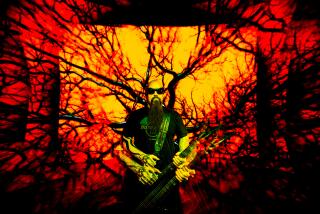Review: Stephen King’s ‘Bazaar of Bad Dreams’ pulls us in and then out

Portrait of Stephen King.
Stephen King, I’ve come to think, is at his most adept when writing in the midlength range. His big novels — “The Stand,” “It,” “11/22/63” — have always felt a little baggy to me, while his shortest work (he has published more than 200 stories, gathered in a number of collections) can feel sketchy, more idea than nuanced narrative.
That middle zone, however: His finest efforts emerge from this territory, shorter novels “Misery,” “Joyland” and “The Shining,” novellas such as “The Body” or the chilling “A Good Marriage.” In this material, King has the breadth to do what he does best, which is to evoke the very human underpinnings of terror, while also remaining constrained by certain limitations of space.
As he explains in “The Bazaar of Bad Dreams,” which gathers 20 pieces of fiction, along with brief reflections on their composition, “Only through fiction can we think about the unthinkable, and perhaps obtain some sort of closure.” The key word there is not the unthinkable in which King traffics, but closure, the closure of the midrange form.
“The Bazaar of Bad Dreams” illustrates this formulation neatly, since the sharpest work here is that approaching novella-length. Long stories such as “Ur” (originally written as a promotion for Amazon’s Kindle) or “Obits” echo with depth and drama, fleshed out with character details, three-dimensional setups, the landscapes of a fully realized world.
In “Bad Little Kid” — inspired, King informs us, by the Beatles’ 1965 cover of Larry Williams’ “Bad Boy” — a man convicted of child murder tells his story: It was not a child he killed, or so he insists, but some sort of shade, a demon that had hounded him since childhood. Insanity? His defense attorney thinks so, until in the aftermath of his client’s execution he receives a piece of evidence suggesting that the condemned man was indeed telling the truth.
“Mile 81” involves a classic King construction, that of the bored kid who goes somewhere he shouldn’t — in this case, an abandoned highway rest area — and ends up staring down an evil that the adults can’t, or won’t, recognize. To call “Mile 81” a coming-of-age story is not exactly accurate; it unfolds over a single afternoon. But for its protagonist, grade-schooler Pete Simmons, the mysteries of the world, both pleasurable and terrifying, bring him to a point of reckoning, after which he will never be the same.
This sense of catharsis, of epiphany even, occupies the center of much of King’s fiction; he is an old-fashioned storyteller, after all. Not for him, the tricks and games of metafiction, although his introductory notes here — both to the collection as a whole and to each individual story — render him a central player in “The Bazaar of Bad Dreams.”
That’s something of a mixed blessing, for as King understands, writing fiction is difficult to explain. “[S]tories,” he writes, commenting on a tragic little saga called “Under the Weather,” “are like dreams. Everything is deliciously clear while the process is ongoing, but all that remains when the story’s finished are a few fading traces.”
And yet, those traces … that’s the idea, the reason we read and write, the reason made-up stories move us, because they are about a deeper reality. King is a perfect case in point: We know the events he describes can’t actually happen, that there are no demons, except for those we carry in our souls.
Here, though, King’s constant authorial presence can’t help but pull us out, disrupting the pattern of the dream. Each time he inserts himself, we are reminded of the construction of the fiction, with the author front and center when it ought to be the other way around.
It’s unfortunate, for there are a lot of good stories in this collection: moving, disturbing and in between. “Summer Thunder” imagines a post-apocalyptic world of startling beauty; “The world was a dying hulk,” King tells us, “but the silence had been banished, at least for the time being, and that was a good thing.” In “Morality,” a marriage goes south when a wife falls prey to the imprecations of her employer — not sexual, but ethical. The idea is that we are all complicit, fundamentally, in what happens to us, that the stain of sin is a collective one.
This is not to suggest that all the pieces in “The Bazaar of Bad Dreams” carry equal resonance: “Blockade Billy,” a baseball fantasia originally published by Maryland’s Cemetery Dance Publications in 2010, remains minor, as does “Drunken Fireworks,” which appeared as an audio book this summer, while the two poems, “The Bone Church” and “Tommy,” are entirely negligible.
Still, that’s what happens in a collection, especially a collection such as this, which comes framed more as a grab bag than a coherent effort in its own right. That’s the message of the title, which suggests a gathering of curios, set out for our perusal in the bazaar of the author’s mind.
When King gives himself a little room to move, the effects are not only unnerving but also deeply human, a series of riffs on love and loss. “They smile into each other’s used faces,” he writes in “Herman Wouk Is Still Alive,” about two aging poets in the moments before and after they witness a horrific highway accident. “… Phil is both surprised and not surprised. At his age — late, but not quite last call — you take what you can and are happy to get it.” (p. 274)
Closure again, or perhaps it’s just the storytelling impulse. Either way, the same holds true for many of the characters King imagines into life.
::
The Bazaar of Bad Dreams
Stories
Stephen King
Scribner: 496 pp., $30
MORE STEPHEN KING:
Stephen King’s ‘Drunken Fireworks’ -- available only on audio
Review: Driven to solve murders in Stephen King’s ‘Mr. Mercedes’
Review: Faith and magic get a ‘Revival’ in new Stephen King novel
More to Read
Sign up for our Book Club newsletter
Get the latest news, events and more from the Los Angeles Times Book Club, and help us get L.A. reading and talking.
You may occasionally receive promotional content from the Los Angeles Times.







